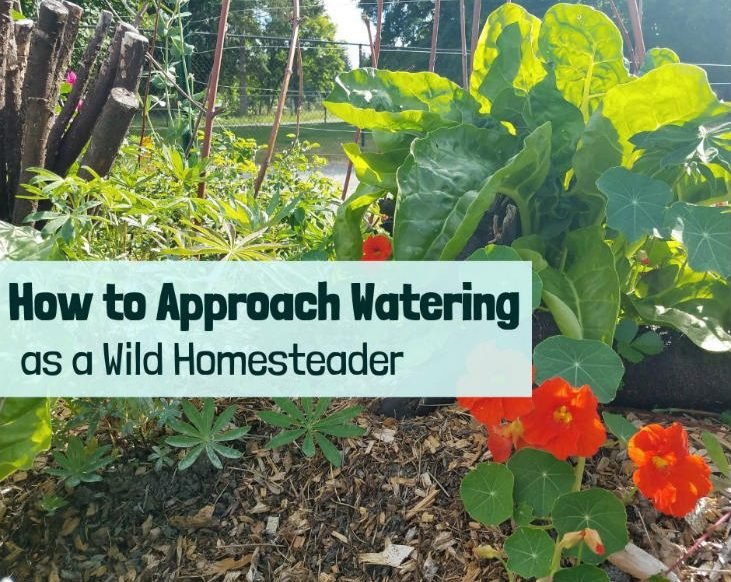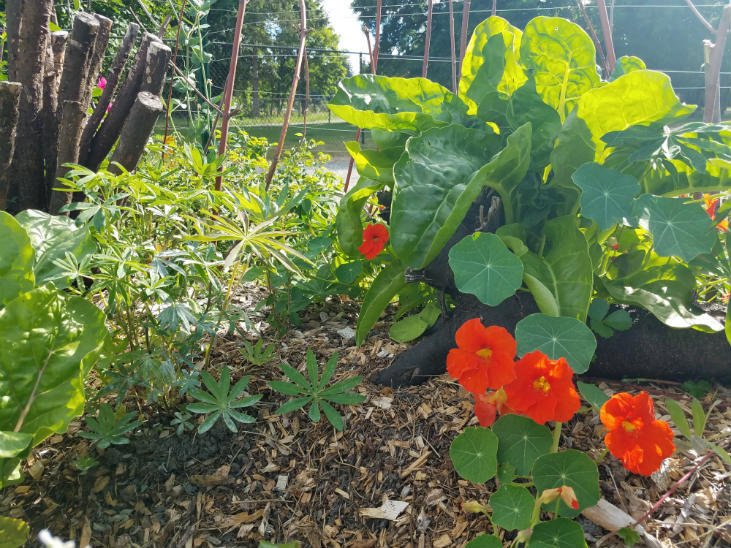
Watering the garden is just one of those things that seems normal for most gardeners. If you read any pack of seed or information tag for vegetables they will talk about watering on a regular basis. But is this really needed?
This week’s blog post is all about changing your mindset around watering. Part of reducing how much you water is using water saving techniques which I talked a lot about in my post “19 Ways to Deal with Drought on the Homestead.”
But another part is changing your mindset around watering. This blog post covers the following mindset changes.
- Relying on passive irrigation instead of active irrigation.
- Not trying to grow a prize-winning vegetable or fruit.
- Accept that plants showing signs of water stress (wilting) don’t always need watering.
Let’s dive into what I mean by passive irrigation instead of active irrigation but make sure to check out the blog post for information on the other 2.
What is Passive Irrigation
I’m not sure if the term passive irrigation is used but I use the term passive irrigation to refer to the watering that nature does on its own (though you can enhance these natural processes). This is the water that is stored in the soil, that collects as dew, and that comes from the life on your homestead.
Often you won’t even see this water since it will show up at night or stays in the soil. But it is there and will provide water to your plants.
Active irrigation is basically all the traditional irrigation methods such as drip hoses, sprinklers, flood irrigation, etc.
I think one reason people don’t tend to rely on passive irrigation is that you can’t see it. When the drought comes and the weather gets hot you can go out and setup the hose and sprinkler and know your plants are getting water. You want to take care of your plants and the passive irrigation just can’t be seen.
But even in the central valley of California they are able to grow tomatoes with no irrigation. While every location is different I think this is a big indicator that all of us can water less. But it does take a mindset change.
Changing Your Mindset for Watering

Changing your mindset towards watering won’t eliminate all your watering but it will reduce it. When you stop trying to grow massive vegetables, when you rely on passive irrigation, and when you learn that dealing with water stress in plants does not always require more water, you will reduce how much watering you do.
You will also have stronger plants with deeper roots that will produce smaller but better tasting produce for you and your family. Plus you will save time, energy, and money while also benefiting the environment by using less water.
Make sure you check out the blog post before you go to learn more about changing your mindset towards watering.
Also, please leave a comment with your thoughts on this week’s post. I would love to hear from you!
Thank you!

Weekly Blog Post
Related Blog Posts
- 19 Ways to Deal with Drought on the Homestead
- 5 Ways to Transform Your Garden into a Low Water Garden
Follow me for more posts all about homesteading, working with nature, and growing your own food: @wildhomesteading
And check out my blog - www.wildhomesteading.com for weekly in-depth posts on working with nature to grow your own food and start/build your homestead.
Thank you for this follow up post!
You've been visited by @minismallholding from Homesteaders Co-op.
As always, some great insights here. I have featured this post in the Homesteading - Living Naturally newsletter.
A community marketplace of ethical, handmade and sustainable products available for STEEM, SBD (and USD): https://homesteaderscoop.com
follow: @homesteaderscoop
This is so true! I tend to be a lazy waterer because I hate dragging the hoses around, but I think the key is more towards water preservation within the soil through mulching rather than bare soil which dries through in the sun, this has always been my problem so this year I intend to be more diligent in my initial planting. Thanks so much for sharing, I missed your last post so I am off to read it 😊
Thank you! :) Mulching is really great but of course it comes with some of its own drawbacks. lol, one drawback I'm dealing with is the robins love to scratch in mulch looking for critters. Which says a lot about the mulch being good for the soil life but the robins scratching is burying my smaller plants... hopefully as I mulch more and more areas they won't spend too much time in the garden. Thanks again!
Mulch, mulch, mulch... and endless application of organic matter to help with soil. To be honest in summer here I give up and use wicking beds.
Posted using Partiko Android